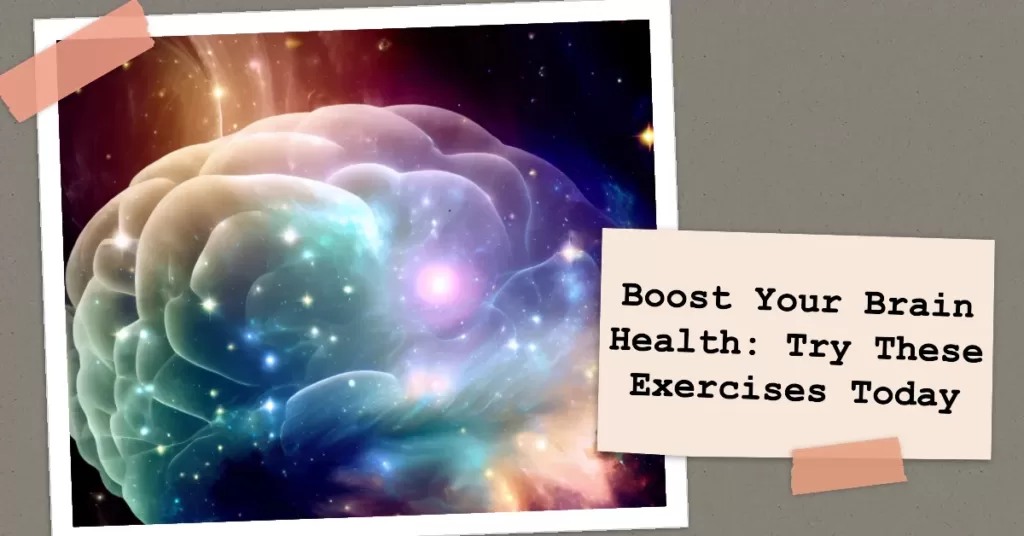In a world that demands constant mental agility, people often find themselves struggling to keep up with the fast pace of life. As our schedules become packed with responsibilities and distractions, it is no wonder that our memory starts to falter. However, there is hope for those seeking to boost their cognitive abilities and enhance their mental health. Through a series of engaging brain exercises, individuals can unlock the full potential of their minds and improve their memory retention in surprising ways. So whether you are looking to sharpen your focus or simply want to remember where you left your keys, these exercises offer an exciting path toward a healthier and more resilient brain.
Table of Contents
The Benefits of Brain Exercises
Engaging in regular brain exercises can have a profound impact on our mental health and overall wellbeing. These exercises, also known as mind training exercises, are designed to stimulate various cognitive functions such as memory, attention, and problem-solving skills. By challenging our brains with new tasks and activities, we can promote positive changes in the structure and function of our brain cells.
One of the key benefits of brain exercises is their ability to enhance brain function. When we engage in mentally stimulating activities like puzzles, crosswords, or learning a new language, we actively work toward improving our cognitive abilities. Studies have shown that individuals who regularly participate in these activities perform better on cognitive tests and have a reduced risk of developing age-related cognitive decline or dementia.
In addition to boosting brain function, mind training exercises can also improve our mood and emotional wellbeing. The stimulation provided by these activities helps release neurotransmitters like dopamine and serotonin – the happiness chemicals that contribute to feelings of pleasure and happiness. Moreover, engaging in challenging mental tasks gives us a sense of accomplishment and improves self-esteem while reducing stress levels.
By incorporating brain exercises into our daily routines, we not only enhance our cognitive abilities but also care for our mental health. So why not make it a habit to challenge your mind every day? Just like physical exercise is vital for maintaining physical health; mind training exercises are essential for keeping our brains sharp and healthy.
Learning a New Language
Learning a new language is not only an intellectually stimulating activity but also a powerful tool for promoting mental health. Several studies have shown that learning a second language can enhance cognitive function and even delay the onset of dementia or other age-related declines in brain health. The process of acquiring a new language involves memory, problem-solving, and attention skills, which serve as effective brain exercises. So why not pick up that Spanish textbook or sign up for online language courses? It could be your ticket to boosting your mental wellbeing.
In addition to the cognitive benefits, studying a new language can also have positive effects on our emotional and social wellbeing. Learning another language offers opportunities to connect with people from different cultures and build meaningful relationships. Being able to communicate in multiple languages opens doors to diverse experiences, deepens empathy, and broadens perspectives on the world around us. Moreover, it provides a sense of accomplishment that boosts confidence and self-esteem – important factors in maintaining good mental health.
So next time you’re looking for ways to improve your mental wellbeing, consider trying out some brain exercises by learning a new language. Not only will you challenge yourself intellectually, but you’ll also open doors to exciting cultural experiences and enhance your overall sense of happiness and fulfillment. Embrace the power of linguistic diversity and reap the many benefits it brings to your mind.
Understanding the Brain-Body Connection
Understanding the intricate connection between the brain and body is crucial to our overall wellbeing. The brain, serving as the command center for every bodily function, relies on constant communication with various body systems. This connection is not one-directional; physical health can influence cognitive abilities just as much as mental health can impact physical functioning.
When it comes to addressing memory loss and improving cognitive functions, engaging in regular physical exercise has shown tremendous benefits. Research reveals that aerobic exercises, such as running or brisk walking, increase blood flow to the brain, promoting the growth of new cells in an area known as the hippocampus. This leads to enhanced memory retention and improved learning capabilities. Interestingly, strength training exercises have also demonstrated positive effects on cognitive functioning by reducing age-related decline.
To truly harness the power of our brain-body connection for optimal mental health, it’s essential to approach training holistically. Engaging in a variety of activities that challenge both our bodies and minds can help create stronger neural connections and promote neuroplasticity. Exploring new hobbies or pursuing activities that require coordination – such as dancing or playing musical instruments – can stimulate multiple parts of the brain simultaneously, enhancing cognitive flexibility and boosting overall mental performance.
Remember: nurturing our brain-body connection through intentional exercise not only contributes to better physical health but also serves as a powerful tool for maintaining sharp cognition throughout all stages of life.
Physical Exercise for Brain Health
Physical exercise is not only beneficial for maintaining physical fitness but also plays a crucial role in improving brain health. While mental visualization training and cognitive skills exercises are often emphasized for enhancing brain function, the effectiveness of physical exercise in bolstering brain health should not be overlooked. Engaging in regular physical activity increases blood flow to the brain, which in turn leads to improved cognitive performance and enhanced overall brain health.
The University of British Columbia reports that aerobic exercise has a direct impact on increasing the size of the hippocampus, a region of the brain linked to memory and learning. This suggests that by incorporating activities like running or swimming into our daily routines, we can actually help our brains generate new neurons and strengthen neural connections. Additionally, engaging in physical exercise promotes the release of endorphins, chemicals that act as natural painkillers and mood elevators. These endorphins have been shown to reduce stress levels and combat symptoms associated with anxiety and depression.
Furthermore, physical exercise provides an opportunity for increased social interaction which is crucial for maintaining optimal mental health. Whether it’s joining a sports team or attending group fitness classes, participating in physical activities allows individuals to connect with others who share similar interests. This social aspect provides both emotional support and intellectual stimulation – key factors known to contribute significantly to brain health.
All in all, while mental visualization training and cognitive skills exercises are vital components of maintaining good mental health; there is no denying that physical exercise also plays an integral role in improving brain function.
Mindfulness and Meditation for a Healthy Mind
Mindfulness and meditation are not just buzzwords thrown around in the realm of self-help; they are powerful brain exercises that can have profound effects on overall mental health. While brain games and puzzles may be popular choices for improving cognitive function, mindfulness and meditation offer unique benefits that go beyond mere mental agility. When we practice mindfulness, we train our brains to be fully present in the moment, allowing us to observe our thoughts and feelings without judgment. This awareness helps cultivate a sense of calm and resilience in the face of life’s challenges.
Research has shown that regular meditation can help reduce stress levels by activating the body’s relaxation response. By focusing on our breath or a particular sensation during meditation, we shift our attention away from distracting thoughts and worries, calming both the mind and body. Moreover, studies have also established a link between mindfulness practices and improved emotional regulation. As we become more mindful of our internal experiences through meditation, we develop greater self-awareness, leading to enhanced emotional intelligence and healthier responses to stressful situations.
Incorporating mindfulness into our daily routine doesn’t require hours of silent meditation; even dedicating just a few minutes each day can make a significant difference over time. The key is consistency – like any exercise routine for physical fitness, regularity is crucial for reaping long-term benefits from these brain exercises.
Cognitive Activities for Mental Wellness
Cognitive activities are not just games for entertainment; they are essential brain conditioning training exercises that can significantly contribute to mental wellness. Engaging in these exercises regularly can help enhance cognitive abilities such as memory, attention, problem-solving, and creativity. One particularly effective method is digital brain training, which involves using specialized software or apps designed to stimulate different areas of the brain.
Numerous studies have demonstrated the positive impact of cognitive activities on mental health. Participation in brain training significantly improves cognitive function and general wellbeing among people. Also, regular engagement in mentally stimulating activities reduces the risk of developing neurodegenerative diseases such as dementia and Alzheimer’s.
Taking part in cognitive activities does not have to be limited to computer-based programs; there are plenty of everyday tasks that can provide similar benefits. For example, learning a new language challenges your brain by exercising multiple areas involved in communication and memory retention. Solving puzzles or playing strategic board games stimulates critical thinking skills while improving focus and concentration. Engaging with group discussions or joining book clubs allows you to expand your knowledge while socializing, creating a comprehensive exercise for both the mind and overall wellbeing.
Incorporating cognitive activities into our lives is vital for maintaining optimal mental health throughout our lifespan.
Conclusion: Taking Care of Your Mental Health
To sum it up, taking care of your mental health should be a priority in our fast-paced and high-stress society. While physical exercise is commonly emphasized for overall wellbeing, it is crucial not to overlook the importance of brain exercises for mental fitness. Engaging in activities that challenge and stimulate the mind can have significant benefits for our cognitive abilities and overall mental health.
It is worth noting that good brain exercises don’t have to be complex or time-consuming. Simple activities like reading, solving puzzles, playing strategy games, or learning a new instrument can all contribute to keeping our minds sharp and healthy. Making these exercises a regular part of our routine can help boost memory, enhance problem-solving skills, reduce stress levels, and improve overall cognitive function.
Additionally, prioritizing self-care plays a vital role in maintaining good mental health. Taking breaks from work or daily responsibilities to practice mindfulness exercises such as meditation or engaging in hobbies that we enjoy can significantly contribute to reducing stress levels and promoting relaxation. Ultimately, by incorporating brain exercises into our daily lives and nurturing both our physical and mental wellbeing through self-care practices, we can achieve optimal mental health and lead more fulfilling lives.




